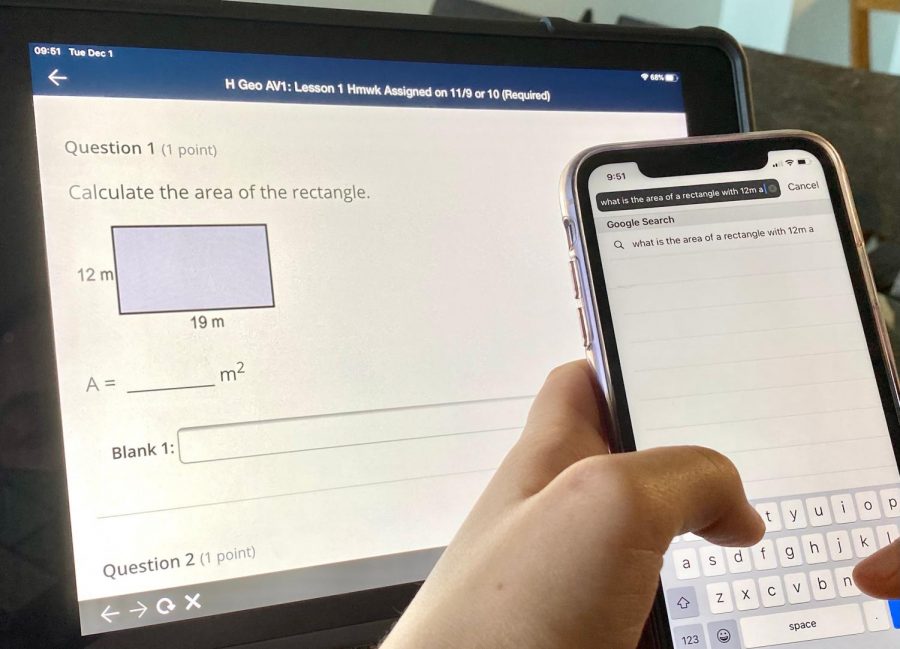Cheating in an Online Environment
December 3, 2020
Cheating has always been an issue for schools. In the last few years, the growth of technology has increased the prevalence of cheating. The advent of online school this past year has made cheating difficult to detect and easy for students to get away with. The answers to their test questions are just a click away. So why do students actually cheat, and what can teachers do to prevent it?
Since this new digital age of online school has begun, cheating seems inevitable.
“Since we’ve had iPads, more and more work has been electronic anyway, which makes copying and pasting easier,” Grant Hendrickson, a social studies teacher at MHS said.
Most tests are online, and multiple choice questions can easily be Googled. Short answer questions can be plagiarized, and essays and homework assignments can be copied.
Andrew Simmons, a high school English teacher and a writer for The Atlantic, the San Francisco Chronicle, and The New York Times, reports that a survey of the United States found that 58% of students had plagiarized papers and 95% of students admitted to cheating in some way. He said that even the most prestigious schools in the country are prone to having students cheat and plagiarize. He said that this is often because students don’t see value in the work they are doing, or they find it repetitive. Other students may cheat because they need to get a good grade on a test or paper in order to get into college.
Lainey Hemink, ‘21, thinks that “a lot of [cheating] has to do with mental health and people just losing the stamina to really really try.”
Students in online school could be especially prone to cheating as a result of feeling burnt out and exhausted from online school. Sitting in front of a screen for most of the day is draining and could be why some students feel the need to cheat. It is usually the easier route to take.
Meg Anderson and Kavitha Cardoza from NPR wrote that one in five kids in the United States show signs of mental health disorders, which can lead to problems in school such as dropping out or getting poor grades.
Hemink said that “a lot of people are dealing with depression and anxiety right now and it can be really difficult to just get that motivation to really […] learn the material.”
Hendrickson said that most students cheat due to the fact that they “get in a pinch because of deadlines and then maybe make a bad decision in trying to get caught up.”
Especially in online school, students could be feeling overwhelmed and think that cheating is the only option when it doesn’t have to be.
Hendrickson said that he “would much rather have a student ask [him] for an extension than do something that would violate the academic integrity policy.”
Another reason for cheating is that students might also find online school more mentally taxing.
Hemink said that having one class only twice a week makes it more difficult for teachers to fit everything into their lessons, and that this leads students to have to cram in order to fill in the gaps.
Hendrickson said that this school format “has become a whole new kind of time management. […] Dealing with a shift to a new kind of time management could hypothetically produce the kinds of situations where someone makes a bad decision because they’re feeling trapped or stressed out.”
Because in online school students may feel more inclined to cheat, how can teachers stop students from cheating in an environment that makes it so easy?
Simmons suggested that teachers decrease repetitive homework assignments. When students feel like they’re doing the same work every day, they become more prone to cheating. Also, instead of multiple choice questions, Simmons encouraged teachers to have more short answers and critical thinking questions on exams. This makes the tests more difficult to cheat on and encourages the students to think independently. He also suggested that teachers praise students for the effort they put into their work as well as the progress they made, rather than how smart they are.
Research shows that students who are praised for being smarter, rather than for the effort they made, feel more inclined to cheat. This is because they feel a need to keep up the reputation of being smart, and if they are unsure about a question or don’t know the answer, they will be less likely to seek out help and more likely to cheat.
Hendrickson has some methods of his own that he uses to ensure students don’t cheat.
He said that it is important to be “proactive in talking to students about [cheating]. […] I know that there are school-wide messages from Mr. Erickson about it, but I also talk about it not only at the beginning of the year but throughout the year.”
Hendrickson has also moved away from multiple choice exams using written exams instead. This way, he says, he is able to utilize Turnitin.com, which tells him if any part of the paper is plagiarized.
Students shouldn’t feel like cheating is the only option to get a good grade. During this difficult time, it is important to prioritize their mental health while maintaining academic integrity. If students struggle in online school, be sure to reach out to teachers for help before resorting to cheating.






























